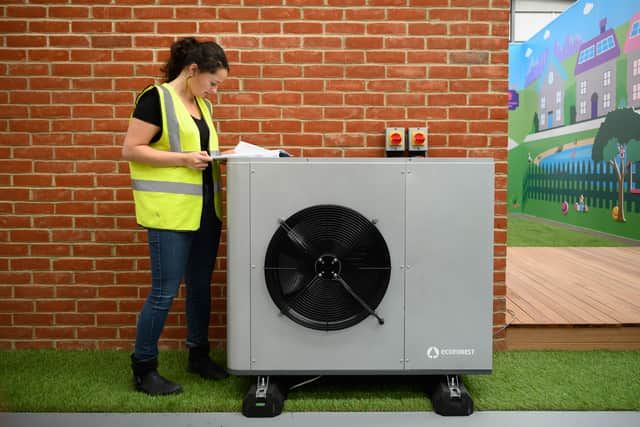What are heat pumps: how much to install heater, running costs vs gas boiler, government grants - do they work
and live on Freeview channel 276
The government has announced that thousands of homes will receive free energy efficiency upgrades, paid for with over £75 million of taxpayers’ money.
Energy Secretary Claire Coutinho said the funds will help some of the lowest-income households warm their homes and save up to £400 annually on energy bills. The upgrades offered will include insulation, heat pumps, and double glazing, among other things.
Advertisement
Hide AdAdvertisement
Hide Ad42 councils and housing associations throughout England will be eligible to apply for the funding, to assist them in co-funding installations in as many as 8,000 homes.
It comes as a report warned that the uptake of clean heat pumps to replace boilers has been less than half the expected levels under a flagship programme.
The Government needs to engage “every household” in the shift to clean heating, the National Audit Office (NAO) said, as it warned that low uptake of heat pumps was slowing progress on cutting emissions from homes.
Heat pumps, a renewable technology which uses electricity to draw heat from the ground, air or water for heating buildings, are a key element of the bid to make homes greener.
Advertisement
Hide AdAdvertisement
Hide AdBut efforts to encourage people to install heat pumps have been slow because costs have remained high and public awareness is low, a report from the independent public spending watchdog said.
Research has shown that around 30% of people have never heard of or know hardly anything about the need to change the way homes are heated to reach net zero.
So what exactly are heat pumps, how do they work, and how expensive are they to install? Here is everything you need to know about them.


What are heat pumps?
At their core, heat pumps are devices that transfer heat from one location to another. Unlike traditional heating systems that burn fossil fuels like gas or oil, heat pumps harness renewable energy sources such as the air and ground to generate warmth.
Advertisement
Hide AdAdvertisement
Hide AdEven in cold weather, outdoor air contains ambient heat energy. Heat pumps extract this heat and transfer it to a refrigerant fluid with a low boiling point like Freon, which has the ability to change state between liquid and gas at relatively low temperatures.
The heated refrigerant is then circulated to the indoor unit of the heat pump. Here, the refrigerant's heat is released into the indoor space through a coil or heat exchanger.
Warmed air is then distributed throughout the building via a fan or blower system, heating the indoor space effectively.
By harnessing heat from the air or ground, heat pumps significantly reduce the need for fossil fuels, thereby slashing carbon emissions associated with traditional heating methods.
Advertisement
Hide AdAdvertisement
Hide AdThis transition to cleaner energy is crucial in the fight against climate change, as it helps decrease reliance on finite resources and mitigates the harmful impact of greenhouse gas emissions.
Heat pumps can both heat and cool spaces - in warmer seasons, the process reverses, extracting heat from inside the home and releasing it outdoors - making them versatile solutions for temperature control in homes.
Are heat pumps expensive?
The cost of installing a heat pump varies depending on factors such as the type of system chosen, the size of the home, and the existing infrastructure.
Air-source heat pumps tend to be more affordable upfront compared to ground-source heat pumps, which require excavation for installation; but ground-source heat pumps often offer higher efficiency and lower operating costs in the long run.
Advertisement
Hide AdAdvertisement
Hide AdThe price of heat pumps has reduced by 6% since 2021, against an expectation by the Government it would fall 25% by 2025 – and they are still four times more expensive than a gas boiler.
Although heat pumps are significantly more efficient than boilers, electricity prices remain much higher than gas, and the Government is around two years behind on its pledge to rebalance energy costs.
But while the initial cost of installing a heat pump may seem daunting, the long-term savings on energy bills often outweigh the upfront investment.
Heat pumps are highly efficient, capable of producing several units of heat for every unit of electricity consumed. As a result, households can experience considerable reductions in their heating and cooling expense over the pumps' lifespan.
Comment Guidelines
National World encourages reader discussion on our stories. User feedback, insights and back-and-forth exchanges add a rich layer of context to reporting. Please review our Community Guidelines before commenting.
